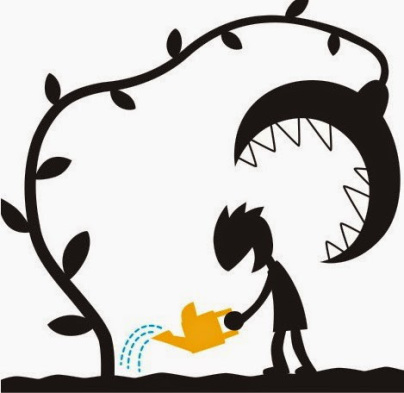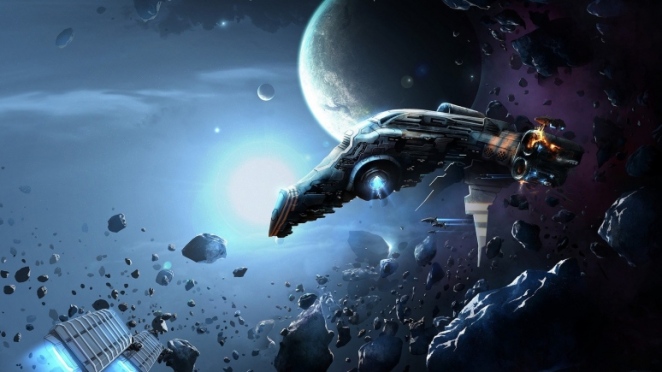
Now I don’t know whether what I did classifies as backstabbing or not, so don’t judge me yet. I mean, I do feel guilty now I’ve done it, but now, what’s done is done, right? And the ends justify the means, right? So I got nothing to lose at all. Well I guess it will be easier for you to judge me if I actually told you what had happened. There, why’d I have to say-‘judge me’? Don’t judge me, just listen.
It all started a couple of weeks ago, when I got this notification on our hostel notice board that a fairy-tale writing competition was about to happen. Everyone was supposed to write a short story titled – Redemption. The first prize was a thousand bucks – that’s a month’s rent, even after I’ve paid your tabs. How ‘bout a beer on the house, now? No? Okay.
Anyways, I’ve been writing fiction ever since I was a little boy, see? Don’t be judging me from what you’re hearing now, this is because I’m nervous it’s not all coming out straight. I tore off the notice, not to cut competition, but just to keep myself motivated, seeing it when I wake up and all that.
I remember keeping the piece of paper on my writing desk. And when I woke up, it was gone! Later it turned out that Jack had it. Can you believe it? Jack, just goes off picking up stuff from my table, not bothering to ask. Oh, who’s Jack? He’s my roommate. Me and him had been living on this hostel for about three months now. I brought him here once; he never paid for that beer. He’s a wannabe writer. Writes screenplays, and has got rejection mails littered across half the room. Sure I didn’t get published, but that’s because the publishers don’t really understand my talent. But his stories, well, let me tell you, are pure scanydoodle. Picks up a bit from Hemingway, a bit from Faulkner, and tries to pass them off as his ‘style’.
So anyway, he stole my notice. The notice I had stolen you say, okay fine, have it your way. He steals the ‘stolen’ notice, and makes this preposterous decision, that he will enter the contest, too. And he said we could review each other’s work. I agreed of course, just to be polite.
The next day, we were brainstorming plots. We split the elements, so he ended up having Dragons, Elves and Trolls, while I had Dwarves, Humans, and Orcs. We didn’t want to use the same creatures, you see, because thought we’d have the same theme then. So anyways, I started off with the epic fight between Humans and Orcs the first day. At night, we swapped our copies, and peer-reviewed. It turned out that he had also started off with a battle, between Elves and Dragons. So I thought, since both of us are having the same approach, may be a lot more of other writers would write ‘bout the same stuff. So I started all over again in day two. I took the Orcs’ point of view – no one sympathizes with Orcs, and that’s plain sad. I mean, they might get hungry for Human meat, right? You know, like humans need to eat meat for vitamin B-12, and so on. So Orcs might have a similar problem. Jack seemed to like by idea, but he stuck to his theme, same good Elf versus bad Dragon. I thought we’d hold off peer review till the stories are done.
Then came the day of submission. Jack had to go home for his sister’s wedding, and I had to mail both of the stories. But before posting, I fell into the dilemma. What if his story was better? I read it, and re-read it, and you know, the story kept feeling better than mine. Well I was actually trying to imagine myself as a critique reading the story. So his idea seemed more mainstream, and more coherent. You know, elves fighting with dragons does have a familiar tinge to it, right? And who’d heard of good Orcs, I mean, my Orcs weren’t even good. Some of them were cannibals, and when will humanity accept cannibalism? Don’t give me that look, it’s just the story I’m talking about. I’m not crazy. And give me a shot of tequila.
So at the last moment, I feel really guilty admitting this, but I have to, you know, I swapped the stories. In my defense, I think I would’ve written a mainstream story as well, if he hadn’t. And firstly, he wasn’t even supposed to know about the contest. He stole the notification from me, right? Had I written the Elf story, mine would’ve been the same thing – same twists, same theme, same creatures. And mine would even have been even better.
So anyways, here’s the outcome. The result came yesterday by mail. Dear contestant, we are happy to inform you that you are our winner –and that shit. But here’s the dilemma, see, I won! So what’s the catch? Nothing, except that it was my story that won – the Orc and Human one. Turns out that the judge had an open mind, after all. After Jack showed me the letter, I was astonished to say the least, and I didn’t know whether I’d laugh or cry. So I did the bold thing now. I told him what I did. I told him I did it by mistake, of course, and by God, it’s the worst mistake of my life, I admit it. But you know what he did? He packed up and left. He won’t even listen to me now, because he knows, deep down, that I’m right.
Just today, I learnt that he is getting an offer from Bloomsbury, for a novel. They really bought into that orc idea. So who do you think is the betrayer here: me, him, or just my luck?
Image: http://learningtolivelikewaterblog.com/2015/11/09/fb-shocker/







